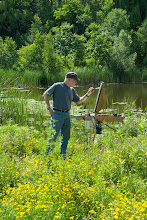This week's edition has a terrific letter that Robert calls 'a classic'.
The writer-painter Charles Philip Brooks runs a teaching studio in North Carolina. He focuses on the American Tonalist and Impressionist schools of painting.
Words to paint by for sure....
"Letter to the Student of Painting"
"Your day contains a great measure of freedom. Your responsibility as a painter is here within the walls of the studio and in the setting of the landscape. You have the opportunity to exercise genuine mastery at every step, and it is in this spirit of grand possibility that I hope you will reflect on the advice made plain here.
Do not grieve too long for the troubles of the outside world. There is important work to be done here. We can best express our care for all others by attending to our work well.
Allow yourself the peace of purpose and the knowledge that to make another attempt with the brush is a noble thing. If you accept the discipline of the truest principles of art, then yours is the reward of an unbroken line of tradition.
Therefore, you may earnestly free your mind of all heartaches, sadness, and transitory despairs. Creation is above these things.
Your vocation is as real and as true as any other. Those who denounce the artist as idle manifest a deep ignorance of the nature of art. Have faith that the civilized will somewhere, at some time, value your well-wrought works. It is a miracle that the world keeps its havens for art and yet it does. Know that to create art is to do a necessary piece of work. The most noble pleasures and measureless joys result from such endeavors. True art is undeniable and it is a gift for all humanity.
The threefold responsibility of the artist is: to creation, to individual talent, and to humanity. For creation - the whole of nature - we must cultivate prayerful awe. This is our source of work and our refuge as well. We should seek harmony with nature. For the individual talent - long hours and years of steady industry hope to find our abilities fulfilled, our minds, hearts, and hands put to valuable service. In this way, we maintain the sanctity of art. Lastly, we make to humanity a willing gift of all we do. Our control over the material world lasts only a lingering moment and it takes a generous soul to build the ambition of a lifetime and then to hand it over in trust to the future.
Painting requires the bravery of solitude. Painting requires disciplined labor. To be a painter is to search the world with a benevolent eye for every subtle beauty that the infinite world offers.
Here is the opportunity to give your honest effort and to add in any small way to the legacy of art. Cultivate patience in your heart and you will improve. Learn to see well and your hand will become sure.
No pain or doubt can invade the honest soul engaged in the communion of creation. We artists must love the world with our deepest selves and forgive it at every turn.
To paint even a little passage with a measure of quality is to achieve a life's triumph.
Spend your days wisely with the best thoughts and works of those who have walked the road before you. Search their paths, their timeless inspirations, and the lineage of their genius. Learn your craft well and your talent will mature into its full possibility. Keep an obedient heart before nature. She is the master above all other masters. Nature is the concrete manifestation of all that remains true and sublime. Let us always be thankful for her abundance and hopeful that we might approach her in our art. Nature will renew every generation of painters, ready to illuminate the minds of those who practice the art with what is calm, rational, beautiful, sublime, and eternal.
Such is the purity of your vocation. Treat every moment before the easel as a quick and tender opportunity. Invest your most noble self. Give your most noble self. To be a painter is to enjoy a precious state of life." (Charles Philip Brooks)

Thank you, David, for posting these encouraging thoughts and words. Your reflection on Kim English painting was also an inspiration.
ReplyDelete